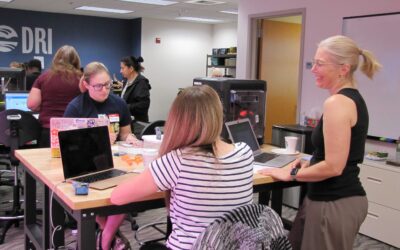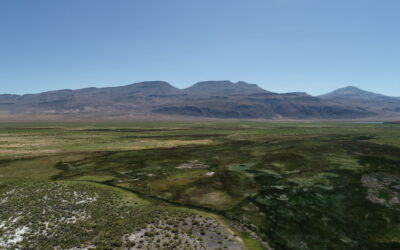Reno & Las Vegas, NV (Feb. 6, 2020): The Desert Research Institute (DRI) and the Nevada Governor’s Office of Science, Innovation, and Technology (OSIT) today announced the creation of three new Regional STEM Networks across the state.
With a growing need for a workforce skilled in science, technology, engineering, and math (STEM) across Nevada and the nation, the state’s new Regional STEM Networks aim to increase student interest and achievement in STEM within the classroom and grow partnerships outside of the traditional classroom to support students.
Networks in Southern, Northwestern, and Rural Nevada will coordinate partners representing K-12 and Higher Education, business, industry, public libraries, after-school providers, non-profits, government, and philanthropy to identify and scale up STEM programs that will prepare students for Nevada’s 21st-century workforce.
“A high-quality STEM education helps students develop important skills like creativity, problem-solving, teamwork, and determination that will prepare them to succeed in their chosen career and as informed citizens. I’m excited to partner with DRI to launch these three Regional STEM Networks in Nevada and increase our collaboration with local STEM partners,” said Brian Mitchell, Director of OSIT.
DRI was selected to coordinate the Networks in part due to the Institute’s record of success in delivering science solutions as well as informal education and outreach programs to Nevadans for more than 60 years. Successful collaboration with regional partners has long contributed to the success of DRI’s Science Alive curriculum kits and teacher professional development courses, Citizen Science programs, STEM-based lecture series, workshops, and conferences for all ages.
“We are delighted to have the opportunity to enhance the STEM ecosystems in all three regions of our State,” said Craig Rosen, DRI Science Alive Administrator and Managing Director for Nevada’s Regional STEM Networks. “We look forward to bringing stakeholders together to identify gaps in STEM educational programming, scale-up quality STEM programs, and collaborate on new ideas and initiatives.”
The three regional STEM Networks will have five important tasks:
- Identify on-the-ground programmatic gaps or implementation challenges in need of a state-level solution.
- Grow interest, awareness, and achievement in STEM in the region.
- Carry out on-the-ground implementation of state-level programs/goals.
- Identify and build local programs and initiatives worthy of scaling statewide.
- Create and facilitate partnerships and the sharing of resources among K-12, higher education, and business/industry within the region.
DRI faculty and staff will host public STEM summits to allow stakeholders to communicate employment needs, highlight complementary informal STEM programs, and target areas for program growth and increased community support. Bringing together stakeholders from industry, the non-profit sector, education, and government, Rosen said he hopes, will lay the foundation for successful partnerships and program building throughout each region.
“We are particularly interested in creating opportunities that work for Nevada students and families from backgrounds underrepresented in the technical workforce,” Rosen explained.
“Through our Regional Network structure, we can address the unique challenges and opportunities of each region at the local level. Increasing student engagement in STEM has proven to translate directly into career success for students of all ages. In Nevada, our hope is that coordinating that engagement statewide will help our State build a robust, diverse workforce that can support the growing demand for STEM professionals throughout Nevada.”
DRI will officially launch the new Regional STEM Networks at public STEM summits in Spring 2020.
The Networks will be overseen by OSIT and the Nevada STEM Advisory Council.
The Desert Research Institute (DRI) is a recognized world leader in basic and applied interdisciplinary research. Committed to scientific excellence and integrity, DRI faculty, students, and staff have developed scientific knowledge and innovative technologies in research projects around the globe. Since 1959, DRI’s research has advanced scientific knowledge, supported Nevada’s diversifying economy, provided science-based educational opportunities, and informed policymakers, business leaders, and community members. With campuses in Reno and Las Vegas, DRI is one of eight institutions in the Nevada System of Higher Education.
The mission of the Nevada Governor’s Office of Science, Innovation and Technology (OSIT) is to coordinate, support, and align efforts by K-12 and higher education, workforce development and employers to improve science, technology, engineering, and mathematics education and STEM workforce development, so that Nevada’s workforce can meet the demands of its growing economy.


